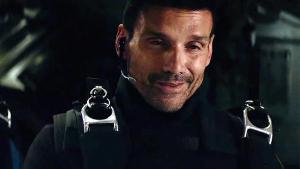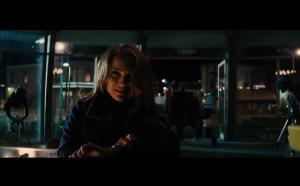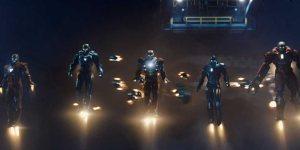By the end of Captain America: The Winter Soldier, SHIELD has been dismantled, HYDRA weakened but not defeated, and Bucky Barnes (Sebastian Stan) appears to finally be fighting his way back through his Winter Soldier brainwashing. The last line of the movie is actually, “When do we start?”, delivered by Sam “Falcon” Wilson (Anthony Mackie) to Steve “Cap” Rogers (Chris Evans) in reference to their mutually assumed mission to track down an AWOL Bucky Barnes. The obvious answer is that they will clearly start right away, and Captain America 3 will again use the Steve Rogers-Bucky Barnes relationship as its emotional center. However, the real answer, at this point, is who the heck really knows when that apparent mission will start because Captain America 3 (now titled Captain America: Civil War) seems to be turning into just the latest Marvel Studios sequel to ignore the promises made by the ending of the immediately preceding entry in the franchise.
The latest news about Civil War is that it will feature Robert Downey, Jr. in a practical co-leading performance as Tony “Iron Man” Stark, Chadwick Boseman will make his debut as Black Panther at some point in the film, and Daniel Bruhl (Inglorious Bastards, Rush) has been cast to play a villain, seemingly misidentified by Variety as Baron Mordo. It will basically be Avengers 2.5 much in the same way that Winter Soldier was Avengers 1.5, with the events of Age of Ultron hugely impacting Civil War’s story and character line-up. Beyond that, we’re all just geeking out over the possibilities, debating how much of the Civil War story from the comics they’ll actually use, and perusing list after list of just who Bruhl could be playing as the villain, wondering if him being a new version of Red Skull is too obvious to be true or so obvious that they clearly assumed we would immediately discount it because of that.

Plus, what about Crossbones, introduced in and revealed to survive the events of Winter Soldier? He’ll surely be a major player, right?
As someone who greatly enjoyed Winter Soldier, I find all of this intriguing. However, this is not the sequel I was promised. When I walked out of the theater after seeing Winter Soldier for the first time I was genuinely looking forward to seeing some sort of advancement on Steve Rogers’ quest to save his former best bud Bucky just as I was mildly curious to see him explore a relationship with Emily Van Camp’s Sharon Carter. Why would I think that? Because the final dang scene of the movie establishes those two plot points as potential big parts of a potential Captain America 3. Sure, to some it was actually deeply frustrating that a movie called The Winter Soldier basically ended on a rallying cry for our two heroes to go get the Winter Soldier. The film’s directors Joe and Anthony Russo have jokingly acknowledged that odd disconnect in interviews, admitting that they couldn’t call it something like Captain America: Hail Hydra because though that would have been more accurate it would have also give everything away. However, weeks after Winter Soldier came out screenwriters Christopher Markus and Stephen McFeely told Collider that we shouldn’t necessarily expect either the Winter Soldier or Sharon Carter to be major parts of the sequel, although they cautioned that was largely because they were still meeting with the Russos and Marvel to figure out what direction to take the script.

Falcon just killing time until Cap gets back to him in time for Civil War
Of course, I haven’t read their Captain America: Civil War script, and I won’t see the movie until it comes out early May 2016. It’s perfectly possible Markus and McFeely have figured out a way to weave in some continuation of the Winter Soldier and Sharon Carter plot points into the more pressing, macro-level narrative forced on them by the likely Avengers-shattering events of Age of Ultron. After all, it’s not like a third Captain America film could really be completely devoted to Cap and Falcon’s search for Bucky, akin to Star Trek 3: The Search for Spock. Captain America: Civil War is probably going to be all kinds of awesome. However, if we think of the Marvel Cinematic Universe as being comprised of $170-200 million budgeted TV episodes instead of films there is a troubling history of unforgivable episode-to-episode continuity errors emerging here.
The most egregious example is how both The Avengers and Thor: The Dark World seem to undercut the ending of the first Thor, which sees Asgard’s way of traveling to other realms destroyed, Loki drifting off into apparent nothingness (or magical black hole), and Jane working on Earth to find a way for Thor to return. I walked out of the theater expecting a second Thor film to open roughly where the last one left off, and then when I learned Thor and Loki would be in Avengers I was clueless as to how Joss Whedon would explain that. He mostly didn’t bother, explaining Thor’s arrival as being due to Odin channeling dark magic and Loki’s arrival due to some connection to the Tesseract. By the time Thor: The Dark World arrived, any hint of Jane having ever searched for a way to return to Thor had gone completely forgotten, her post-Thor life instead re-contextualized as that of a woman struggling to get over an especially brutal break-up. Plus, that rainbow bridge destroyed in Thor’s climax was now built anew, a potential barrier to our heroes harmlessly waved away in-between films, although if you look closely the CGI on The Dark World’s version of the bridge features some tell-tale signs of a crack that had been mended.

To be fair, this was never meant to be the final shot of Thor. It was actually supposed to be the first, but Kenneth Brannagh flipped it to the end during the editing process.
Now, The Avengers: Age of Ultron seems to be pulling the same trick in relation to Iron Man 3’s ending. My step-dad, who’s never read a comic book in his life, innocently asked me after he saw Iron Man 3, “Tony no longer has the battery thingy in his chest, and he gave up being Iron Man to save his relationship with Pepper, right? So, how is Iron Man going to be in the next Avengers movie?” I mustered something about how Tony could build Iron Man suits with their own power source, and that he could fly them remotely much as he did during the Barrel of Monkeys scene in the film. Plus, maybe he didn’t really give up being Iron Man in the traditional sense, although it sure seems like the film’s ending argues that though Tony will no longer wear the suit he is and will always be Iron Man.
For all we know, there may not actually be anyone inside that Iron Man suit we see multiple times in Age of Ultron’s trailer. Maybe Tony’s piloting it remotely. However, what must Pepper think of all this? Iron Man 3’s emotional climax features Tony self-destructing his fleet of Iron Man robots, going off like foreworks for Pepper to enjoy over his shoulder as they embrace. It was the best Christmas gift he could have given her because it was his way of signaling his commitment to their relationship, yet now Age of Ultron will see robots and an artificial intelligent Tony creates rising up and attempting to wipe out all of humanity. To me, that doesn’t really jibe with Iron Man 3’s ending, which is partially because Iron Man 3 seemed like it was in the unenviable position of needing to close out Tony Stark’s story just in case Marvel couldn’t negotiate a new contract with Robert Downey, Jr. It had to do so in a way that didn’t actually close the door on the character.

Would it be nice to still have all of these robots come Age of Ultron? Or would that film’s Skynet-like villain actually use those robots as weapons against us?
But it’s not just complicated contracts that bring these kinds of things about. A lot of is probably down to the lack of continuity behind the scenes, with no director making more than 2 films for Marvel to this point, and only Captain America enjoying the benefit of having the same exact screenwriters (Christopher Markus and Stephen McFeely) for all of his solo films. They do at least have Kevin Feige overseeing things, and a consistent braintrust of Marvel higher-ups behind him who have more of a hand in shaping these films than we realize. It is simply a daunting storytelling task to try and set up sequels for each of these super heroes while also having to account for the fact that in-between their solo films they will appear in a team-up Avengers film. So, that means Avengers has to figure out how to explain Thor’s dangling plot threads, and Age of Ultron has to kind of ignore Iron Man 3’s emotional climax because there’s simply not enough screen time to go around for each character let alone to waste on lengthy exposition scenes.
To be fair, this is not exclusive to Marvel. If you jump over to Warner Bros., Batman v Superman: Dawn of Justice is not looking like the Man of Steel sequel you would have expected. That movie ends with all of the traditional Superman elements in their place, and now that the origin story was out of the way we could get on to watching Clark Kent and Lois Lane working together at the Daily Planet, the interesting new wrinkle being that Lois would be helping him keep his super hero identity secret. If Man of Steel’s problem was that it wasn’t really the more traditional Superman movie you wanted then a sequel could finally get around to doing that. Instead, they’ve turned into a Justice League prequel, and though pretty much all of its plot will be keyed off of the reaction to the immense destruction Zod and Superman brought to Metropolis it is still not really a true Man of Steel sequel.
Jumping back to Marvel and looking even further ahead, at least director/writer James Gunn is saying the right things about Guardians of the Galaxy 2, namely that it will not shy away from the first film’s ending which teased the mystery of who exactly is Peter Quill’s alien dad.
Collider argued earlier this year that treating superhero sagas like television instead of cinema was a bad idea, concluding:
Approaching films as television drowns out the singularity of each feature. We’re not only being denied unique, filmmaker-driven takes on properties, but we’re being robbed of complete stories. In this moviegoing climate dominated by reboots, sequels, and franchises, we’re inundated with movies that are either setting up a trilogy or an overall interconnected franchise. This denies us the satisfaction of a genuine ending for a lot of these films, which, you know, is kind of an important part of storytelling.
At this point, I’ve kind of adjusted to the lack of complete closure being offered by these always-leave-it-open-for-the-sequel movies. Marvel is simply adapting the comic book form in its purest sense to the screen, and endings teasing the next issue’s villain or mystery are remarkably common. However, what annoys me is the way that some of Marvel’s non-endings don’t quite match up with future installments, an error all the more apparent when their films are watched in a marathon. When your movie ends on a rally cry, Jane Foster making a breakthrough in her search for Thor, Captain American pledging to go after the Winter Soldier, it’d be nice if your next installment honors that. That didn’t happen with Thor, and even with all the cool stuff being added to Civil War I hope they don’t completely forget about the Winter Soldier.
So, have I completely and totally misread the endings for Thor, Iron Man 3, and Winter Soldier? Or is it simply not that big of a deal if Marvel’s movies don’t follow through on absolutely everything from sequel to sequel because they still manage to hang together than most comic book movies? Plus, who’s to say that Winter Soldier couldn’t simply be held back for dramatic purposes, emerging out of nowhere when Cap really needs him down the road? Let me know what you think in the comments.

